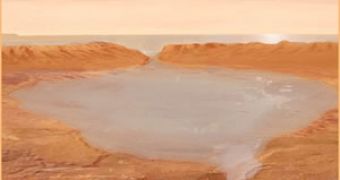A new study of the thermodynamics of clays discovered on the surface of Mars came up with surprising results, which contradict existing theories on atmospheric formation processes on the Red Planet and force scientists looking for other explanations.
Vincent Chevrier of the University of Arkansas and Fran?ois Poulet and Jean-Pierre Bibring of the Universit? Paris-Sud in Orsay, France, reported some interesting findings after studying valleys, clay formations and gullies on Mars.
All evidence seems to indicate the presence of water in the early history of the planet, since on Earth, clay forms in highly humid environments, with water present in both the liquid and the gaseous states.
The clay formations on Mars are thought to be remnants of ancient surface and atmospheric conditions, making researchers theorize that the earliest era on the planet, the Noachian period, had a carbon-dioxide-rich atmosphere that created a warm, wet surface with liquid water.
However, this theory has encountered an obstacle, the fact that no carbonate formation was found on Mars so far, which should have accompanied clay formation if the planet had a carbon-dioxide-rich environment.
"If you had a thick atmosphere of carbon dioxide, you should have abundant carbonates," Chevrier said. "So far no one has seen even a grain of carbonate."
Still, the author suggests there may be other processes involved that could explain both the existence of clay formations and the lack of carbonates. One of them is the possibility of greenhouse gases, like methane, helping to create the ancient conditions that shaped modern-day Mars.
Another one is implying that impacts with meteorites from deep space could have created enough energy to warm up the entire surface of Mars, thus creating liquid water.
This theory might have raised more questions than it answered so its developers believe the best way to solve this problem is by sending a new Mars rover with a probe.

 14 DAY TRIAL //
14 DAY TRIAL //